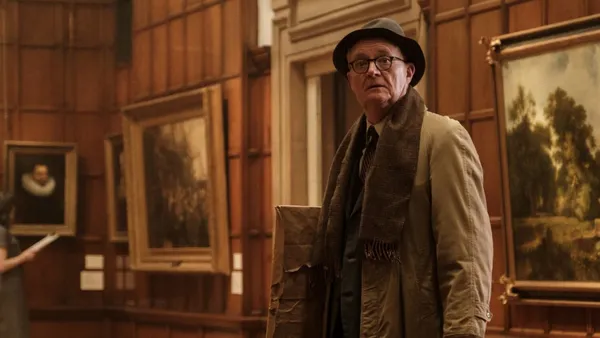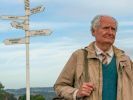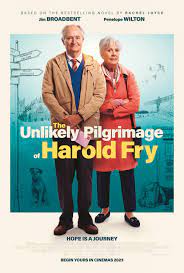Eye For Film >> Movies >> The Unlikely Pilgrimage Of Harold Fry (2023) Film Review
The Unlikely Pilgrimage Of Harold Fry
Reviewed by: Andrew Robertson

The novel, based on a Radio 4 play, is preceded by a quote from Bunyan. The film, in an effort to similarly evoke nested layers of Englishness, has Jim Broadbent. If one digs further, and the earth is rich, Harold and Fry are both of Nordic origin, army-ruler, seed. There's a Rex and a Queenie, more authority, a Maureen, variously diminutive of Mary and amongst others from the Irish 'star of the sea' from the old Egyptian Miriam. There are others, another version of 'Beloved' in David, but there we start to enter the realms of the biblical.
Not a living document, necessarily, but the mixture of state religion and national identity that inflects Anglicism and the English, the speculative fictions of proverbs and Just So, that cloying confection of jam and Jerusalem. Through it travels Harold Fry, an unlikely pilgrim. If one tries to one can readily shift its vowels back an age or two. It might derive from a workplace and suburbia but it is more of Canterbury than the canteen.

Having opened lexical doors I'll say that mendicant might be more apt, though latterly it more connotates active begging than dependence on alms. Fry's progress is informed by charity, and more, but also something transcendent. The dervishes span to ecstatic enlightenment, here Harold goes the long way to the shops and just keeps on.
I mention a long way to the shops because it lets me reference Douglas Adams. A film might be big, but the Fry franchise is really big. Not six volumes, yet, but, like the Hitchhiker's Guide, a loose trilogy. A tale not just told but re-told, and given the extent to which it is based upon other tales further than that. Also, though, that Adams' work was radio, then rewritten, then replayed and recreated. Rachel Joyce, who writes, has several other works. This was her début novel but she's penned dozens of plays for radio. Harold's pilgrimage started as a three-hander in what i suspect was the afternoon slot. Attempts to track it down with the archives are complicated by later programming discussing the novel on the same station that served as home.
I read the book. Not before - in discovering that it was based upon one I sought it out. A local library ostensibly had a copy and when I stopped in they discovered they had not seen it since 2013 or so, an electronic record not updated. I had places to be, a journey of my own, but found it the next morning in a harbourside charity shop. Fortune has a way with these things sometimes. Adaptation (like titles of translation) is one of my hobby-horses. That it was Joyce herself who readapts lends this some strength. Drafts aren't just for pulling carts.
Some moments that struck me in the film are quite distinct from the book. One section in a doctor's office struck me as improbable in interpretation, but colder on the printed page the reaction I'd expected had different weight. The dozens of encounters I marked individually with small green sticky notes are cut down to a handful. Details are changed, a house becomes a farm, an apple is given greater heft in a pregnant silence. All part of travelling light, sun and star settling across the landscapes.
Penelope Wilton's parallel journey as Maureen sees some subtler changes, but in the novel the fate of soup and net curtains reflects a quieter turmoil than on screen. There are ways to project interiority but in using them for Harold they are denied to others. Hettie Macdonald, like Joyce, has a background in theatre. This is not her first feature. She brought Beautiful Thing, which she had directed on stage, to screens nearly 30 years ago. Kate McCullough's camera captures brows on faces and hillsides with equal aplomb. That said, a shot of Harold gazing up at murmurating starlings is weirdly focused, as if some artefact of lensing was replicated to mask later compositing. The blurry foreground adds what seems an accidental uncertainty, but that might be a function of familiarity with the business of film.
There's nothing as nakedly narratorly as a line in the book that starts "Harold thought of the people," but similarly there's nothing too secret. As it's of a religious bent and born of a play, there'd be hope for more mystery, and while there are revelations, they are often obviously foretold. The score is often heavy handed, manipulative strings and songs and music by Sam Lee and Bernard Butler. These are foregrounded over a couple of scenes, the shedding of material possessions that in the book is achieved by a series of awkward encounters with tourists and crying children is done here with a somewhat bald montage.
Hair colours are changed. T-shirts too. Whole characters are elided, stations on the way are dropped as if this were an express service. The highlights are much the same, the low points too. There's mention of suicide, means and method depicted, and the details of it are differently distressing to the way the book handles it. In other places things that words can do for free are made simpler to film, but as counter the sparkle of light is much easier in theatres than on the page.
The countryside gives too. There are moments where the blue sky is crossed with vapour trails, a jet-age evocation of Calvary. In others the sun lances through clouds. Sometimes it is the rain that spears a splashy path groundwards. These all summon ghosts, memories, an annihilation of self in exhaustion. To exercise, to exorcise.
It does comfort, it does resolve, much as earlier versions have. It is a reassurance, its resolution matches that of Fry. It may waver, but it knows where it is going, and in the journey has something to say. Would I have liked something less sugared, less sweet? I think it had room to be more difficult. In retelling it feels as if it has been smoothed. This is scones and teacakes, not pickles. For all the talk of plasters this is less bandage than balm. It holds onto one of the more awkward encounters, a bit of intergenerational (sexual) politics, but loses a scene with a famous actor that I found incredibly easy to picture. They might have had a quota of familiar faces that was exhausted by people who've been in Casualty or the like. That connection was drawn from the off, the font used for the title harkened back to things like The Good Life, a southern sitcom Seventies.
Broadbent's foggy reserve and beetled brand are able to the task. Fry is driven to walk North, from Fossebridge or so to Berwick-Upon-Tweed. Toponyms both, a ditch crossing, a barley farm on a Brythonic border. That grip of land and -scape minded me of JA Baker's The Peregrine, but the closest I've ever seen to its wild passage was 2016's The Challenge. That is as arch, headlong in its reserve, something that brittles icily through the senses. Fry's pilgrimage is more pastoral, suburban if not bucolic, based in beds and breakfasts and hedgerows and homeware shops. I thought it astonishing that there are scenes on train platforms and station cafes but never once a garden centre. There's mention of a Body Shop, and plenty of discussion of boots, but even in its recognisable footprints there seem steps missing in the film.
The copy beside me as I type this will probably stay here in this holiday cottage. It's that sort of book, will remain so even after the film. It is a bit of respite, a time away, a moment of arrival. Will it stay with me forever? Absolutely not. Will I recall it with fondness? Likely. Is this true of the film? Undoubtedly.
Reviewed on: 28 Apr 2023


















